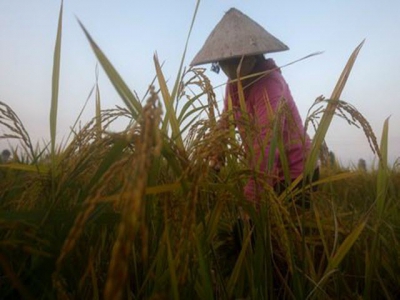Vietnam rice rates gain on fears Mekong water woes may hurt crops

Rice export prices in Vietnam rose for the first time in six weeks as domestic buying picked up and fears of water scarcity in the country's rice bowl grew, while weaker local currencies weighed on rates in other top Asian exporting hubs.
A farmer harvests rice on a rice paddy field outside Hanoi, Vietnam, June 7, 2018. Photo: Reuters
In Vietnam, rates for 5 percent broken rice rose to $360-$370 a tonne on Thursday from $360 last week.
"Demand is higher and exporters are rushing to buy rice from farmers to fulfil the orders signed earlier this year," a trader based in Ho Chi Minh City said.
Prices also rose because the Mekong Delta provinces are facing water shortages as farmers start sowing for the summer-autumn crop, another trader said.
In India, the world's leading exporter, the 5 percent broken parboiled variety fell to around $375-$378 per tonne this week from last week's $377-$380 range.
"Demand is weak from African, as well as Asian buyers, even after reducing prices," said an exporter based at Kakinada in the southern state of Andhra Pradesh.
The aggressive selling of old inventories by China to African buyers was also weighing on prices, exporters said. A dip in the rupee, which fell to a seven-week low on Thursday, was another factor prompting exporters to cut prices.
India's rice exports for April-February dropped 9.4 percent from a year earlier to 10.57 million tonnes, as leading buyer Bangladesh trimmed its purchases due to a bumper local harvest, a government body said.
Meanwhile, faced with falling prices, officials in Bangladesh reiterated that the country was considering a review of its long-standing ban on rice exports.
"We need to protect farmers' interests, at the same time we can't let the prices rise," a senior official at the country's food ministry said.
Bangladesh, traditionally the world's fourth biggest rice producer, banned overseas shipments of some common rice varieties in May 2008 after a spike in domestic prices. It banned all rice exports a year later.
Thailand's benchmark 5-percent broken rice prices were quoted at $385-$388 a tonnes, free on board Bangkok, from $393-$411 last week, mainly due to the weakening of the baht against the U.S. dollar.
"Despite the drop in prices, Thai rice remains less competitive compared with other exporters like India and Vietnam," a Bangkok-based trader said.
With the potential for a drought this year, supply remains a concern for Thai rice traders.
Có thể bạn quan tâm
 Rice drags Q1 agro-forestry-fishery exports down
Rice drags Q1 agro-forestry-fishery exports down Agriculture, forestry and fisheries exports value went down 2.9 percent year-on-year in the first quarter of 2019 to $8.8 billion.
 Tan Yen stamps on farm produce for origin traceability
Tan Yen stamps on farm produce for origin traceability Agricultural produce’s origin traceability to promote the products’ prestige, hence helping them earn a good income and expand the consumption market.
 Sugar industry could be sweeter with restructuring
Sugar industry could be sweeter with restructuring The domestic sugar industry should restructure all stages of its production process towards diversifying products to improve competitiveness